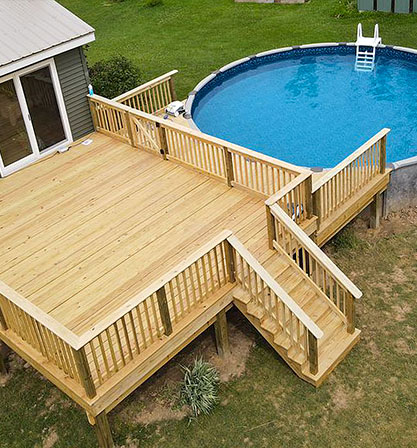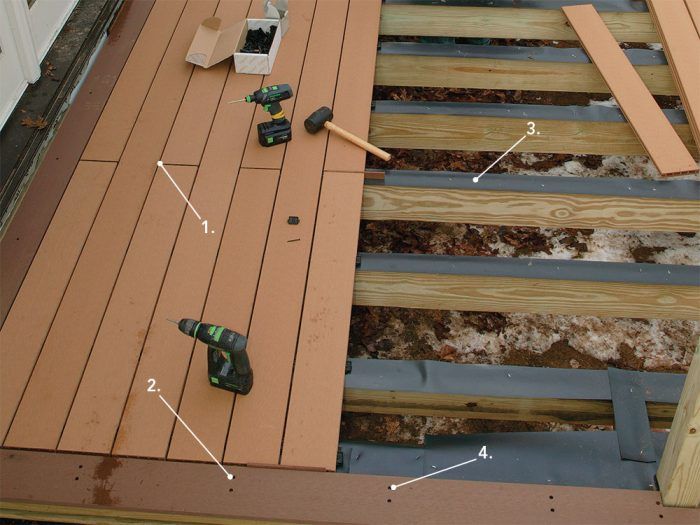Get a consultation today from a local expert specializing in deck installation Austin TX.
Exactly how to Select the Right Materials for Your Deck Setup Task
Picking the appropriate materials for your deck installation job can appear daunting. There are various elements to think about, from longevity and maintenance to appearances and ecological influence. The option in between conventional timber and composite materials, each with its very own set of advantages and drawbacks, can be particularly challenging. The secret is to balance your budget plan, design preferences, and way of life requires to develop a deck that will certainly boost your exterior space for years to come.
Understanding the Various Kinds Of Deck Materials
When getting started on a deck installment task, the choice of materials comes to be an essential decision. Composite materials, on the various other hand, are a mix of timber and plastic, giving toughness and resistance to weather components. By recognizing these differences, homeowners can make a more educated decision on the most appropriate deck material for their details demands.
Assessing the Durability and Maintenance Requirements of Deck Materials
Assessing the longevity and maintenance needs of deck products is an essential action in deck installation. Durability involves the material's capacity to stand up to harsh weather, wear and tear, and its longevity. For instance, cedar and redwood are naturally resistant to rot and bugs, making them durable options. On the other hand, pressure-treated timber, while durable, might require even more maintenance because of its sensitivity to splitting and deforming.
Recognizing maintenance demands is similarly important. Some materials need regular securing or discoloring to maintain their look and resist wetness damage, while others, like composite outdoor decking, demand less maintenance. By evaluating these factors, one can pick the most suitable outdoor decking product, guaranteeing an equilibrium between resilience, maintenance demands, and aesthetic allure.
Expense Evaluation: Contrasting Wood and Composite Decking
Although expense may originally seem like a secondary worry, it is a significant aspect when comparing timber and composite outdoor decking. On the various other hand, composite outdoor decking, while pricier at first, calls for much less upkeep, possibly minimizing lasting costs. Potential deck proprietors need to consider their budget plan and desire to preserve their decks when making a decision between timber and composite decking.
Visual Appeals and Design Versatility of Decking Materials
While cost is an important consideration, the visual appeal and layout versatility of outdoor decking products also play a considerable role in the decision-making procedure. Various materials supply varying levels of visual appeal. As an example, all-natural wood decking gives a classic, classic appearance, while composite products use a wide variety of shades and structures to suit varied preferences and styles. Similarly, layout versatility refers to the capability to shape and manipulate the outdoor decking product to fulfill specific style requirements. Wood, for example, uses high layout adaptability because of its convenience of reducing and shaping. Compound products, while less versatile in layout, are still versatile enough for a lot of deck layouts. These factors, as a result, are essential factors in the selection of outdoor decking product.
Environmental Impact of Decking Materials
When choosing decking materials, one must consider not only appearances and resilience, but likewise the environmental impact. It's essential to evaluate the sustainability of materials and explore recycled decking options. Additionally, comprehending the prospective effect on local ecosystems will make certain an extra eco accountable option.
Examining Product Sustainability
In the world of deck building and construction, examining material sustainability is a critical step. Composite decking materials commonly incorporate timber and plastic, reducing the demand for new wood however boosting dependence on fossil gas - deck installation. Hence, the option of decking products ought to stabilize capability, aesthetics, cost, and sustainability to guarantee a liable and durable setup.
Recycled Decking Options

Compound decking is especially prominent as a result of its longevity and convenience of upkeep. It's resistant to rot, bugs, and fading, making it a lasting alternative. Recycled plastic outdoor decking, on the other hand, is highly durable and needs very little maintenance. While these products might lug a greater first cost, their long life and lowered ecological effect make them a smart financial investment for the eco-conscious home owner.

Effect On Local Ecological Communities
While the benefits of utilizing recycled materials for decking can not be overstated, it's equally vital to take into consideration the wider environmental ramifications of these choices. Appropriate disposal of old decking is essential to reducing landfill waste. Basically, an eco-conscious deck task needs cautious material option, sustainable sourcing, and liable disposal.
Making Your Decision: Tips for Choosing the most effective Deck Materials
As the write-up shifts into the subtopic of "Making Your Last Decision: Tips for Selecting the very best Deck Materials", it is crucial to recognize the variety of deck products available. Striking a balance between durability and aesthetics is crucial in this choice process. The adhering to discussion will certainly direct visitors in making an enlightened choice based upon these vital considerations.
Recognizing Various Deck Materials
The task of picking the appropriate products for your deck installment can appear intimidating as a result of the vast variety of options readily available. Understanding the various materials can simplify this procedure. Timber is a popular option, using a classic aesthetic and price. Kinds of wood utilized consist of pressure-treated lumber, cedar, and redwood. Compound products, made from a blend of wood and plastic, are low-maintenance and resistant to rot and pests. Plastic or PVC decks are much more long lasting and call for less maintenance why not try here than composite materials, however they can look much less all-natural. Aluminum decks are strong, lightweight, and resistant to rot, but they are also the most pricey alternative. Each product has its very own advantages and downsides, making it essential to consider your specific needs prior to making a last decision.
Resilience vs. Appearances Equilibrium
Balancing resilience with visual appeals can be a challenge when picking deck products. The decision frequently boils down to individual preferences and the deck's planned use. High-traffic areas may require sturdy products like composite outdoor decking, which holds up against wear and tear but might lack the all-natural elegance of wood. On the other hand, timber provides a timeless allure and warmth that artificial products struggle to reproduce. It requires extra maintenance and might not last as long. Therefore, house owners require to strike a balance, taking into consideration both the deck's sensible demands and their visual preferences. By doing so, they can ensure their deck stays a functional and appealing outdoor area for years right here to find.
Verdict
Finally, picking the appropriate products for your deck setup project requires careful consideration of factors such as durability, upkeep, expense, aesthetic appeals, and environmental impact. Whether you choose standard wood or composite materials, your selection must line up with your budget, layout preferences, and way of living. Inevitably, the very best outdoor decking material is one that boosts your outside space and gives satisfaction for several years ahead.